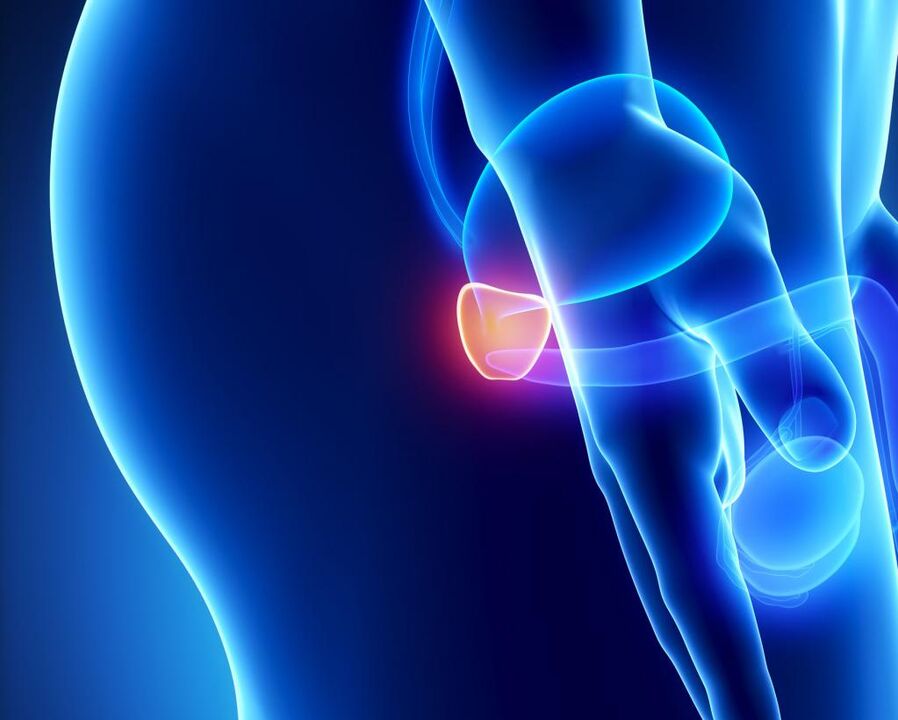
Prostatitis is a common disease that affects men of all ages.Prostatic inflammation brings a lot of inconvenience to people's lives. If not treated in time, it will inevitably lead to dangerous complications.Of course, many people are looking for more information about pathology.
Why does inflammation occur?How to tell if a man has prostatitis, can you do it yourself?What treatments does modern medicine offer?How dangerous is prostate cancer?
General information about the disease
What are the causes of prostatitis in men?Signs and symptoms, complications, and treatment are important things to learn.But first we should consider some general information.
Prostatitis is a disease associated with inflammation of the prostate tissue.As you know, this is a small, unpaired organ located beneath the bladder - it actually covers the urethra.The secretion produced by the prostate is part of semen.
Statistics show that the disease most commonly affects people between the ages of 25 and 50.Approximately 50-85% of patients aged 50 and older experience some form of prostate inflammation at least once in their lives.
As you can see, this is a very common disease.This is why men look for more information.How do you know if you have prostatitis?What symptoms should you watch for?Are there effective treatments?
Causes of the development of prostatitis.Predisposing factors
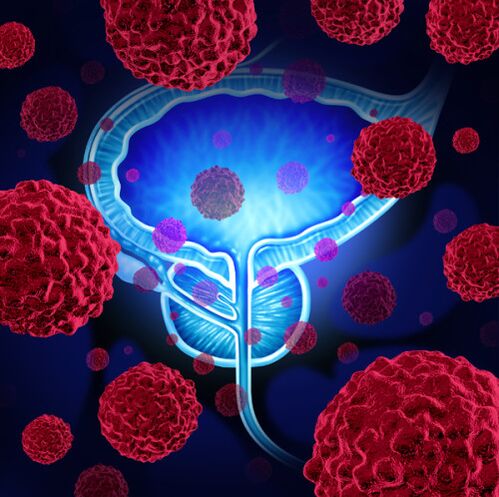
Many men are interested in the first symptoms of prostatitis.Symptoms and treatment, possible complications, and diagnostic features are very important information.But first, it is worth considering the reasons for the development of the inflammatory process.
The cause of the inflammatory process is the activity of pathogenic microorganisms.Infections may be specific.For example, prostatitis is the result of a sexually transmitted disease.If we are talking about non-specific inflammation, then the cause is the activity of Staphylococcus, Streptococcus and E. coli bacteria.Sometimes prostatitis occurs against the background of herpes.Of course, there are risk factors whose effects may trigger the onset of the inflammatory process.
- First of all, it is worth noting that this disease can occur against the background of other infectious diseases, including colds.
- Risk factors include irregular sex life.For example, promiscuity increases the likelihood of infection in the body.Long-term abstinence can also be harmful.Ideally, sex should be regular, preferably with the same partner.
- Prostatitis usually occurs against the background of stagnant processes in the pelvic area.Risk factors include sedentary work and a sedentary lifestyle.
- Hypothermia (systemic and local) also triggers the development of inflammatory processes.
- Risk factors include chronic constipation and other digestive tract disorders.
- The inflammatory process may be the result of urethral reflux, which is accompanied by the reflux and reflux of urine into the reproductive tract.This disorder is often associated with inflammatory disease of the urethra or improper bladder catheterization.
- Changes in hormonal levels are also potentially dangerous, especially when male sex hormone levels drop.By the way, this is why mature and older men are more susceptible to prostatitis.
- Risk factors include ongoing stress and nervousness, dietary errors (especially excess spicy food), and alcohol abuse.If there are preconditions, these factors may trigger the inflammatory process or exacerbation of chronic prostatitis.
Doctors should not only know how to identify prostatitis in men.It is important to find out what exactly triggers the development of this disease.
Prostatitis in men: How to recognize it?Description of main symptoms
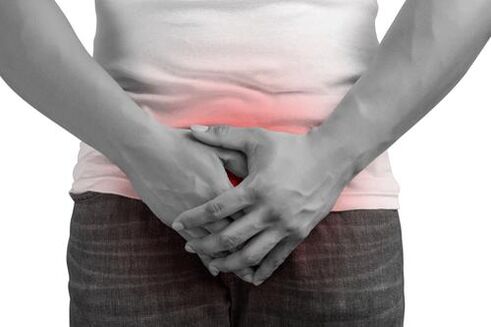
We are already familiar with the main causes of the development of inflammatory processes.But many men are interested in the question of how to diagnose prostatitis on their own.In fact, this is impossible as tests and examinations are required to confirm the diagnosis.But you can suspect this disease by observing very characteristic signs.
- What are the symptoms of male prostatitis?Symptoms of the disease include various urinary tract disorders.The patient complains of increased impulsivity.At the same time, daily urine output did not increase.The urge can occur even before the bladder is full.
- An enlarged prostate puts pressure on the urethra, causing the flow of urine to be weak and often interrupted.Sometimes, in order to have a bowel movement, a man must strain and tense his abdominal muscles.
- The urge to urinate at night can also become more frequent—men sometimes wake up several (or even dozens) times during the night, affecting the quality of their rest.
- The process of urinating is often accompanied by an unpleasant sensation, sometimes a sharp stabbing pain.
- In case of acute inflammation (especially with accumulation of purulent masses), the body temperature may rise to 37-39 degrees.
- The patient complained of perineal pain that worsened during physical activity, sexual intercourse, and defecation.Sometimes the pain is so severe that it is almost unbearable.
- Sometimes urine contains blood.This is a dangerous symptom that should not be ignored.Hematuria may indicate abscess rupture, development of urolithiasis, or malignant growth.
- Erection problems can also occur, although not in all cases (especially if we are talking about acute inflammatory processes).
These are the main symptoms of prostatitis in men.They should not be ignored under any circumstances - be sure to see a doctor immediately at the first sign of discomfort.
Characteristics of chronic inflammation

You are already familiar with the main symptoms of prostatitis in men (how to tell if a man has this disease is discussed below).According to statistics, the acute form of this disease, if left untreated, sometimes develops into chronic prostatitis.Sometimes, the chronic form of inflammation is primary—its first stages appear with hidden symptoms.In most cases, this type of disease is the result of stagnation processes in the pelvic area.
The symptoms of the disease remain the same.The patient complained of perineal pain and urinary problems.Sometimes there is discharge from the urethra during defecation.Men often experience problems during sex - they may experience erectile dysfunction, unpleasant sensations during intercourse and ejaculation.Sometimes, chronic prostatitis can lead to complete impotence.This disease is much more difficult to diagnose and treat.
What complications can this disease cause?

You already know what symptoms to look out for and how to recognize the disease.Prostatitis is a dangerous disease that should not be ignored under any circumstances.Very dangerous complications are possible.
Acute inflammatory processes are often accompanied by glandular suppuration and abscess formation.An enlarged prostate can put pressure on the urethra, causing acute urinary retention.Additionally, abscesses can open on their own, causing the abscess to travel into the urinary system or intestines.
Chronic prostatitis is equally dangerous because it causes glandular tissue to be gradually replaced by connective tissue, forming scars and stones.Chronic inflammation can affect potency and lead to erection problems.Additionally, the affected glands are unable to produce high-quality secretions to support sperm, which can lead to problems with conception and sometimes infertility.
How do men identify prostatitis?List of diagnostic measures
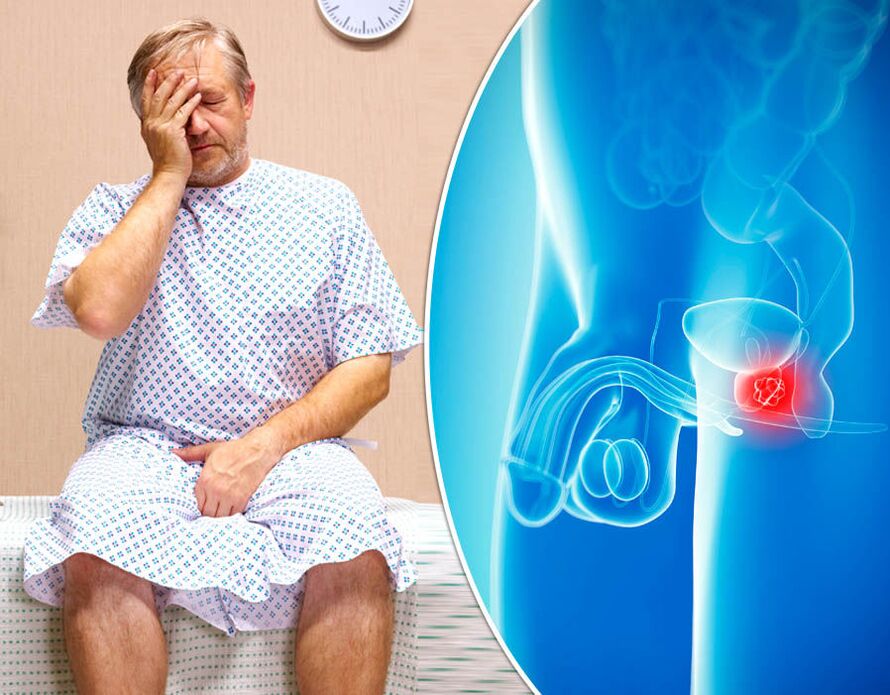
If you observe the above symptoms, you should consult a specialist.How is prostatitis diagnosed?In this case, various programs are widely used.
- First, the doctor collects information about the symptoms that bother the patient, the presence of certain diseases, and lifestyle.
- The gland itself needs to be examined.How do men get a prostate exam?Palpation is performed rectally.During surgery, your doctor may notice an enlargement of the prostate and changes in its structure.If we are talking about inflammatory processes, then palpation is often accompanied by a very unpleasant, painful sensation.
- During a rectal exam, a sample of prostate secretions is usually taken for analysis.If it contains bacterial microorganisms, and the acidity of the environment increases, this indicates the presence of inflammatory processes and the activation of one or another infection.
- Urethral smear test is mandatory.This process, while unpleasant, is very informative.Samples were sent for PCR diagnostics and bacterial culture.The research helps detect and identify infectious diseases, including sexually transmitted diseases.
- General urine and blood tests are performed to confirm the presence of inflammatory processes in the body.
- Diagnostic options also include cystoscopy.Doctors use special equipment to examine the urethra and bladder from the inside.This makes it possible to detect certain urological diseases.
- Uroflowmetry is also mandatory.This program allows you to determine the speed of your urine flow.This is important when diagnosing prostatitis and hyperplasia.
- How do men diagnose prostatitis?Prostate ultrasound is mandatory.This is a simple, convenient, and painless procedure that can examine the glands, determine their size and shape, detect existing stones, and more.
- Sometimes (if an accurate diagnosis cannot be made) the patient is sent for magnetic resonance imaging.
drug treatment
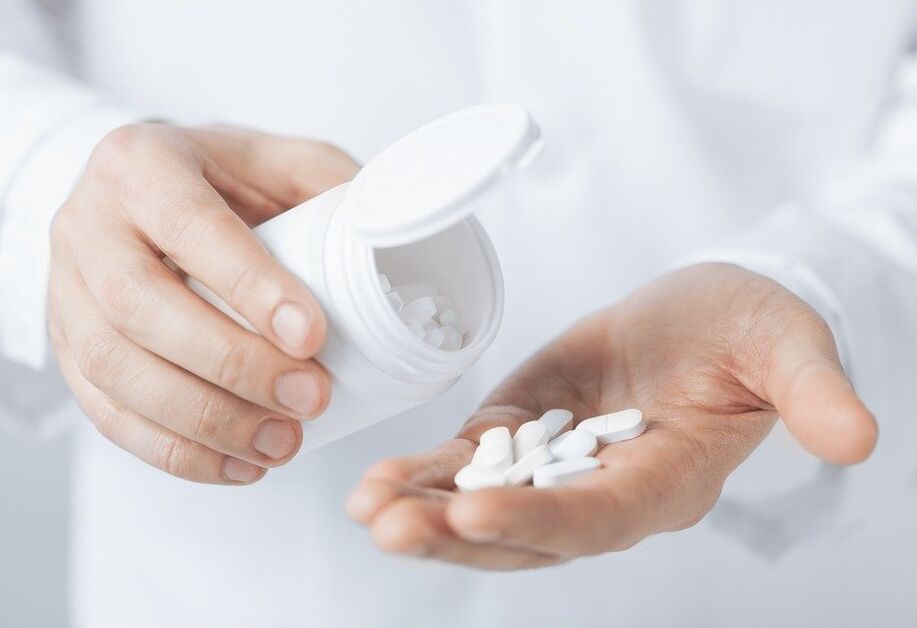
You already know how to identify prostatitis in men.After a thorough diagnosis, the doctor will certainly formulate a treatment plan - this will vary from person to person, since it depends on the reasons for the development of the disease, the characteristics of its course, etc.
Hospitalization is required only in cases of severe poisoning and suspected abscess formation.In all other cases, treatment was performed on an outpatient basis.
Since the inflammatory process is associated with the activity of bacterial microorganisms, antibiotics must be included in the treatment regimen.Symptomatic treatment is also carried out - patients are prescribed anti-inflammatory drugs, analgesics and antipyretics.If an abscess is present, surgery will be performed to open it.
You already know what the main symptoms of prostatitis in men are.The first signs are sufficient reason to consult a doctor immediately.In fact, acute inflammation can quickly turn into chronic inflammation.Symptoms become less noticeable, but the glandular tissue undergoes irreversible changes that can no longer be corrected.
physical therapy procedures
For chronic diseases, physical therapy is necessary - it's the only way to stop the disease.Of course, patients have to take antibiotics, and the course of treatment is quite long (sometimes 2-3 months).
Massage of the prostate is mandatory (contraindicated during acute inflammation).During the procedure, it is possible to normalize the outflow of prostate secretions and improve blood microcirculation (and corresponding tissue nutrition).
The patient was sent for laser and ultrasound treatments.Sometimes a warm micro-enema is given using a special liquid.Treatment options also include immunomodulatory drugs.
prostatitis diet
You already know the symptoms and treatment of prostatitis.Signs and treatment options may differ in men.But in any case, treatment must be accompanied by a proper diet.
- The basis of the diet should be vegetables and fruits, salads with olive oil, nuts and dried fruits.
- Soups, broths, lean meats and fish are allowed, but only boiled or grilled.All kinds of grains are useful.
- But you must temporarily give up fatty meats, eggs, flour products and butter.In fact, regular consumption of such products can increase cholesterol levels, which can deposit on blood vessel walls and impair blood circulation to the prostate.
- Spicy foods and condiments, pickles, canned foods, semi-finished products, salty foods, and smoked foods are taboo.These foods can irritate the intestinal wall and trap water in the body.
- You need to give up alcoholic beverages.It's important to drink enough fluids.Fresh juice would be beneficial.But at night, you should limit your water intake - this will reduce the number of trips to the toilet during the night.
Agreed, this diet does not offer too strict dietary restrictions.But by following a diet like this, you can indeed speed up the healing process, improve the function of your digestive tract, and strengthen your immune system.
Prostatitis and sexual activity

You already know how to determine if a man has prostatitis.But many patients are interested in whether sexual activity can be maintained during treatment.
It is worth noting that regular sex directly affects the condition and function of the prostate.Too frequent, promiscuous relationships and prolonged periods of abstinence are potentially dangerous.
But if an inflammatory process has occurred, then you should temporarily stop sexual activity.Of course, prostatitis is a purely male disease, in most cases related to the activity of non-specific microorganisms, and therefore is not transmitted through sexual intercourse.However, male semen contains products of various inflammatory processes that can negatively affect the function of the organs of the female reproductive system.It is best to wait until you have fully recovered before having sexual relations.
Prevention: How to prevent the development of disease?
Now that we know the function of the male prostate, how do we know if this organ is inflamed?If the disease is not diagnosed promptly and treatment is initiated too late, a host of unpleasant complications can occur.This is why it is much easier to try to prevent the development of the disease.
There are no medications that can protect the prostate from inflammation.However, following some recommendations will help significantly reduce your risk of developing this disease.
- Doctors recommend carefully monitoring personal hygiene and avoiding wearing synthetic underwear that is too tight.
- Keep in mind that prostatitis can be caused by a sexually transmitted infection.Therefore, one should abstain from promiscuity and use condoms.
- Nutrition also plays an important role.In addition to food, the body must get enough nutrients, fiber, minerals and vitamins.
- Physical activity (fitness classes, active recreation, daily jogging or walking) prevents stagnation of blood in the pelvic organs, which also reduces the possibility of inflammatory processes.
- Doctors recommend giving up alcohol, smoking and other bad habits.
- It is very important to strengthen your immune system.Hardening and preventive intake of vitamin complexes will help with this.
- It pays to lower your overall stress levels and learn to cope with adverse situations.Remember that nervousness directly affects hormone levels and often leads to reduced immune system activity and the development of certain diseases.
Men over the age of 40 need to have an annual check-up - only in this way can prostatitis be diagnosed promptly.How to identify a disease, how to plan a treatment, how to prevent complications – only doctors know this.You should not ignore this problem, nor should you try to solve it yourself.






























